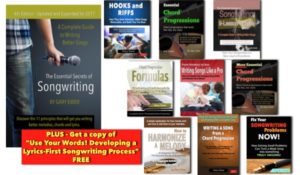If you ask songwriters to describe the most difficult part of starting any songwriting process, I’m sure many — perhaps most — would say, “Deciding what to write about.”
A song is a kind of social interaction. There are vague similarities between singing a song you’ve written, and having a conversation with someone, but with the important difference being that the other party in the conversation doesn’t get a chance to respond in kind. It’s a one-sided conversation.
 “Chord Progression Formulas” shows you a system for creating your own progressions in seconds using some basic formulas, in both major or minor keys. It’s available at the Online Store.
“Chord Progression Formulas” shows you a system for creating your own progressions in seconds using some basic formulas, in both major or minor keys. It’s available at the Online Store.
A one-sided conversation is seen as a negative; there are usually no good ones. And so there are probably many ways in which we shouldn’t necessarily be using those kinds of monologues as a model for good songwriting. “Motivational speaking” is a better analogy.
But sticking with the metaphor of “one-sided conversation, if you were to have a one-sided conversation, and make it a good one, you’ll find that they have many things in common with good songwriting:
- You’d have the responsibility of choosing the topic of conversation, so make it a good one.
- You’d avoid the temptation to preach.
- Because the person you’re conversing with must be silent, you’d need to say things in such a way that allow them to have some sort of emotional reaction. “Emotional reaction” means “emotional connection.”
Having a one-sided conversation that doesn’t go well means that the other person’s only meaningful way of reacting is to make sure that they don’t find themselves in the same situation again. They’ll avoid you.
And that’s another similarity with songs that don’t go well. People don’t get a chance to respond directly to what you’ve written about. Their only meaningful way of reacting is to avoid your music.
Keep in mind that not everyone will love your music, and the fact that someone doesn’t like your songs shouldn’t automatically be seen as a failure on your part. Not everyone will like your songs, and that’s normal.
But for every time you start a new song, remind yourself:
- I am starting a one-sided conversation where the other party doesn’t get to immediately respond.
- I need to find topics that a silent partner will find interesting and have an emotional reaction to.
- I need to use imagery, analogies and metaphors that allow the listener to imagine more than what I’m able to describe in a lyric.
In that sense, being a songwriter is indeed more like being a motivational speaker: you’ve got a big audience, you’re guiding the “conversation,” and your final hope is that you leave your audience feeling engaged, motivated and connected.
 Written by Gary Ewer. Follow Gary on Twitter
Written by Gary Ewer. Follow Gary on Twitter
 If you don’t have a process when you try to write, you’ve just discovered why you find it hard to finish the songs you start. Get “The Essential Secrets of Songwriting” 10-eBook Bundle
If you don’t have a process when you try to write, you’ve just discovered why you find it hard to finish the songs you start. Get “The Essential Secrets of Songwriting” 10-eBook Bundle











Hi Gary,
Thanks for your most recent blog …. the one sided conversation / song analogy. I hadn’t quite thought of it in that way before, amazing as that might seem. The musical form of communication does follow the same rules of engagement as conversation when you really consider it, the melody part if it’s good and appealing can draw someone in but can you captivate them and their emotions/ imagination through your lyric/storyline can you touch them in someway,? Maybe the chorus part let’s them get that word in edgewise as your story unfolds, and they temporarily forget this is a not quite the usual conversation. Stan Rogers was a master at making this emotional connection, good stories, great lyrics, and choruses that gave you a part in the telling …. even if you could not originally know/ nor remember the lyrics after many listenings. Thanks again, Jim